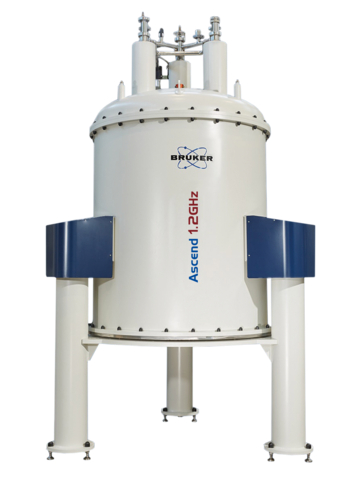COVENTRY, United Kingdom– -Bruker announces that the United Kingdom is expanding its fundamental research infrastructure with recent orders for two 1.2 GHz Avance™ nuclear magnetic resonance (NMR) spectrometers for the University of Warwick and the University of Birmingham. Each institution already has a Bruker 1.0 GHz NMR spectrometer and will advance their capabilities further for research into the materials properties for energy storage and biofuels, as well as into structures and interactions of biomolecules such as proteins, nucleic acids, carbohydrates, lipids, and metabolites. System installations are expected in 2025, and scientists from across the UK will have access, while students can gain experience at the forefront of research.
The University of Warwick 1.2 GHz NMR will advance research in improved plant biofuels, batteries, and solar cells by studying molecular structures and dynamics of advanced materials. The scientific insights gained help improve efficiency and durability of renewable energy technologies, and to develop novel materials.
Professor Steven Brown from the University of Warwick Solid-State NMR Group commented: “The linking of the new 1.2 GHz spectrometer at the University of Warwick to the 850 MHz and 1 GHz systems of the UK High-Field Solid-State NMR Facility will enable UK scientists to push forward frontiers in diverse fields from batteries and catalysts to pharmaceuticals and plant biomass.”
The University of Birmingham will utilize the increased sensitivity and resolution of 1.2 GHz NMR to advance research in functional and structural biology, and drug discovery. Researchers will study the structure, function, interactions and pathways of proteins and other biomolecules. As an example, they will study the structure of enzymes involved in antibiotic resistance, which could help in development of new antibiotics.
Teresa Carlomagno, Professor and Academic Lead of HWB-NMR University of Birmingham stated: “NMR plays a unique and key role in the understanding of molecular mechanisms in health and disease contexts. This is in particular because of its ability to deal with dynamics and disorder, which are often responsible for the regulation of these mechanisms. We are excited to add the 1.2 GHz NMR from Bruker to our research infrastructure and push our biomolecular research beyond current boundaries.”
Dr. Falko Busse, President of the Bruker BioSpin Group, commented: “I am pleased to announce two orders for 1.2 GHz NMRs from the Universities of Warwick and Birmingham. Not only does GHz-class NMR advance life science research, but GHz-class NMR also advances research in batteries, biofuels, and renewable energy. Bruker supports the UK science community and looks forward to many groundbreaking discoveries.”


